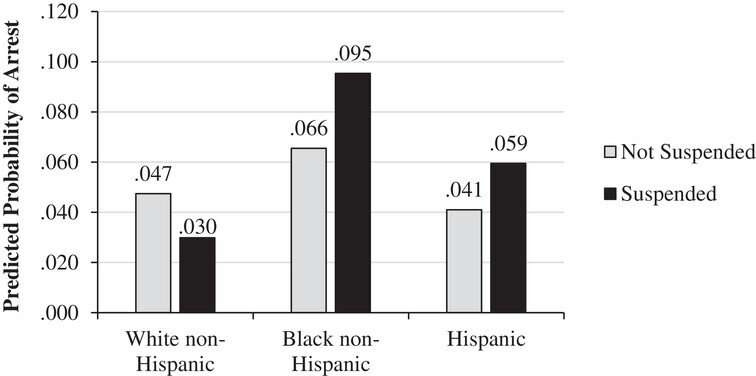This article has been reviewed according to Science X's editorial process and policies. Editors have highlighted the following attributes while ensuring the content's credibility:
fact-checked
peer-reviewed publication
proofread
School suspensions amplify Black, Hispanic students' risk of later arrest, study finds

Research shows that school suspensions do not deter but instead amplify future punishment, what has been termed labeling theory: the idea that the symbolic label that comes with a suspension shapes how others perceive students. But few studies have examined racial and ethnic differences in this process, even though critical race theory (CRT) suggests that the consequences of suspension likely differ across racial and ethnic groups due to stereotypes.
In a new study published in Criminology, researchers examined how the relation between suspension and subsequent arrest differs for White, Black, and Hispanic students. They found that suspension amplified Black and Hispanic students' risk of later arrest relative to White students, whose risk of arrest was not amplified by suspension and in some cases was even diminished.
"Suspending students catalyzes a racially contingent process by which Black and Hispanic students experience an increase relative to White students in their likelihood of being arrested," says Benjamin W. Fisher, associate professor of civil society and community studies at UW-Madison, who led the study. "Our findings underscore the importance of understanding that the labeling process has different effects by race and ethnicity."
As criminologists look at ways to reduce arrests, they consider youth's experiences at school, which is a prominent pathway to arrest. Although suspensions are common, studies indicate that they are not an effective deterrent. Similar to arrest, suspension often marks a turning point that sets youth on a course toward future delinquency and involvement with the criminal legal system. And although there are clear racial and ethnic disparities in the use of both suspension and arrest, research has not adequately studied the extent to which the consequences of being suspended for future arrest differ by students' race and ethnicity.
In this study, drawing on CRT and using nationally representative data, researchers examined how the likelihood of being arrested following a suspension from school differed across racial and ethnic groups (i.e., Black, White, and Hispanic). Their data came from more than 8,000 participants in the National Longitudinal Study of Youth (NLSY) 1997. NLSY youth were born between 1980 and 1984, lived in the United States in 1997, and were interviewed annually starting in 1997 (with about 80% of respondents re-interviewed each year); this study drew on annual data from 1997 to 2002.
Black and Hispanic students were consistently more likely to be arrested following a suspension than their White peers, the study found. This was especially true for Black students, suggesting that not only are schools more likely to use suspension to address Black students' behavior, but the harms associated with the practice accrue most to Black students relative to White students. Suspension of White students did not increase the likelihood of subsequent arrest. In fact, the study found that in some cases, being suspended reduced the likelihood of subsequent arrest for White students.
The study's findings are consistent with a theoretical perspective that integrates labeling theory with CRT, suggest the authors. The link between suspension and subsequent arrest was strongest for Black and Hispanic students because the label conferred by schools' suspension of students is consistent with prevailing stereotypes that link Blackness to criminality and Hispanic people to illegality. Thus, the symbolic label would be expected to be salient given its reinforcement of existing stereotypes.
White students' suspension is inconsistent with stereotypes linking Whiteness to innocence, suggesting that the label conferred on them would have less salience. In this way, the labeling process operates differently across different racial and ethnic groups.
The study's findings have implications for public policy, suggesting that the use of school suspension may be one driver of the racial disproportionality in the youth's involvement with the criminal legal system. Increasing awareness of racist stereotypes (e.g., through curricula) and undertaking efforts to counter and dismantle them will likely help break the patterns the study identified, according to the authors.
In addition, it may be beneficial to establish a firewall between schools and the criminal legal system when it comes to students' educational data, including suspension records. This would minimize the impact of the suspension label, especially for nonviolent offenses, which make up a large number of the offenses that lead to suspension.
Among the study's limitations, the authors note that they did not analyze race and ethnicity aside from broad categories, nor were they able to analyze the behaviors or personal biases that led to school officials' decisions to suspend or arrest students. In addition, the study focused on one form of school-based punishment (suspension) and one type of secondary sanctioning (arrest), so the findings should not be generalized to other forms of punishment.
"As the United States continues to debate whether and how to strive for racial equity, it faces persistent racial and ethnic disparities in both education and the criminal legal system," notes Alex O. Widdowson, assistant professor of criminal justice at the University of Louisville, who coauthored the study. "Because suspension is a particularly harmful practice for Black and Hispanic students, we join calls for alternative approaches to responding to student behavior."
More information: Benjamin W. Fisher et al, Racial and ethnic differences in the consequences of school suspension for arrest, Criminology (2023). DOI: 10.1111/1745-9125.12344
Journal information: Criminology
Provided by American Society of Criminology




















